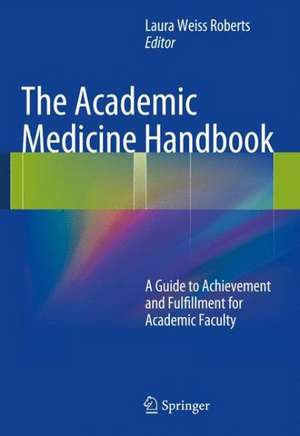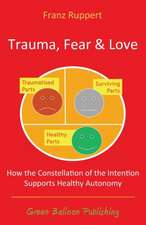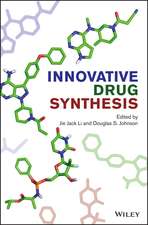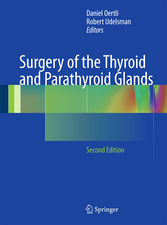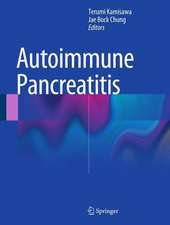The Academic Medicine Handbook: A Guide to Achievement and Fulfillment for Academic Faculty
Editat de Laura Weiss Robertsen Limba Engleză Paperback – 3 apr 2013
Preț: 567.61 lei
Preț vechi: 597.48 lei
-5% Nou
Puncte Express: 851
Preț estimativ în valută:
108.62€ • 113.26$ • 90.28£
108.62€ • 113.26$ • 90.28£
Carte disponibilă
Livrare economică 27 februarie-13 martie
Livrare express 13-19 februarie pentru 52.82 lei
Preluare comenzi: 021 569.72.76
Specificații
ISBN-13: 9781461456926
ISBN-10: 1461456924
Pagini: 508
Dimensiuni: 178 x 254 x 27 mm
Greutate: 0.91 kg
Ediția:2013
Editura: Springer
Colecția Springer
Locul publicării:New York, NY, United States
ISBN-10: 1461456924
Pagini: 508
Dimensiuni: 178 x 254 x 27 mm
Greutate: 0.91 kg
Ediția:2013
Editura: Springer
Colecția Springer
Locul publicării:New York, NY, United States
Public țintă
Professional/practitionerCuprins
Finding
your
path
in
academic
medicine
Laura Weiss Roberts
2 How to Build the Foundation for a Successful Career in Academia
Upinder Singh
Linda M. Boxer
3 How to Be Organized and Manage Time
Robert K. Jackler
4 How to Align Individual Goals with Institutional Goals
Sabine Girod
II Getting Established
5 How to Prepare the Best Possible Curriculum Vitae
Heather Kenna
6 How to Interview
Bob Chayer
Jon A. Lehrmann
7 EVALUATING A LETTER OF OFFER OR CONTRACT
Andrew Norton,
8 How to Give a Lecture
Sallie G. DeGolia
9 How to Build Assessments
Teresita McCarty
10 How to Supervise Trainees in Clinical Settings
Michael D. Jibson
Michael I. Casher
Sara R. Figueroa
11 HOW TO EVALUATE AND GIVE FEEDBACK
Jennifer R. Kogan
12 How to Teach in Clinical Settings
Frederic W. Platt
James T. Hardee
13 WRITING EFFECTIVE LETTERS OF RECOMMENDATION
Joseph B. Layde
14 Creative Teaching
Wetona S. Eidson-Ton
Hendry Ton
15 Educational Innovation Using Technology
John Luo
Robert Boland
Carlyle Chan
16 Maintaining Excellent Clinical Documentation
Justin A. Birnbaum
17 How to avoid medicolegal problems
Liliana Kalogjera Barry
III Approaching Work with Colleagues
18 How to Network and Be a Good Colleague
Edward Kass
Laura B. Dunn
19 Best practices in interprofessional collaboration in academic settings Nathan Hantke
Penelope D. Zeifert
20 FROM LESSONS LEARNED: MENTEE PERSPECTIVE ON MENTORSHIP Amy Becker
Joel Yager
21 How to Be a Good Mentor
Jonathan F. Borus
22 How to Participate in Institutional Review Board Activities
Ann Freeman Cook
Helena Hoas
23 How to Participate in Ethics Committees
Ryan Spellecy
Cynthiane Morgenweck
Arthur R. Derse
24 Intervening With Unethical and Unprofessional Colleagues
Jerald Belitz
IV Writing and Evaluating Manuscripts
25 How to Write and Publish an Empirical Report
Alan Louie
Laura Weiss Roberts
26 How to Write a Case Report
Richard Balon
Eugene Beresin
27 How to Review a Manuscript
Thomas W. Heinrich
28 How to Evaluate Biomedical Research Publications Rigorously
Teddy D. Warner
29 How to Understand Flaws in Clinical Research
Teddy D. Warner
V Conducting Empirical Research
30 How to conceptualize a research project
Shaili Jain
Steven E. Lindley
Craig S. Rosen
31 How to Conduct a First Small Project
Michele T. Pato
Colin P. Dias
32 How to Prepare an IRB Application
Melinda Hantke
33 HOW TO ENGAGE COMMUNITIES IN RESEARCH
Emmanuel Mwau Ngui
34 How to Approach a First Grant Application
Cheryl Koopman
35 Funding Your Research While Maintaining Your Curiosity
Michele T. Pato
Carlos N. Pato
36 How to Review Grant Applications
Ruth O’Hara
Shelli Kesler
37 How to Prepare a Poster
Manpreet K. Singh
38 How to Prepare and Give a Scholarly Oral Presentation
Cheryl Gore-Felton
VI Developing Administrative Skills
39 How to Be an Effective Team Leader and Committee Member of Chair Sabine C. Girod
40 The Art of Principled Negotiation in Academic Medicine
Mickey Trockel
41 How to think about money in academic settings
Marcia Cohen
42 Departmental Strategic Planning
Robert C. Robbins
43 How to Read a Basic Budget
David J. Peterson
44 How to Strengthen Your Own and Others’ Morale
Michael D. Jibson
VII Advancing Your Academic Career
45 HOW TO CREATE YOUR PACKAGE FOR PROMOTION
Judith P. Cain
David K. Stevenson
46 How to understand promotion criteria for “traditional” & “research” tracks
Cheryl Gore-Felton
47 How to Understand Promotion Criteria for ‘Clinician Educator’ and ‘Teaching’ Tracks
Michelle Goldsmith
48 How to Develop an Educator’s Portfolio
Deborah Simpson
49 How to Build a National Reputation for Academic Medicine Promotion Sidney Zisook
Laura Dunn
50 How to Recognize and Address Unconscious Bias
Daisy Grewal
Manwai Candy Ku
Sabine Girod
Hannah Valantine
51 IMGs in Academic Medicine: Challenges and Opportunities
Nyapati R Rao
52 How to “Pitch” a Non-traditional Career Path
Margaret S. Chisolm
VIII Balancing Professional and Personal Life
53 How to Approach a Healthy Life Balance
Christine Moutier
54 How to Care for the Basics – Sleep, Nutrition, Exercise, Health
Christopher Guest,
Rebecca Smith-Coggins
55 How to Manage Personal Finances
David J. Peterson
Roger Strode
56 PROFESSIONAL RELATIONSHIPS AND FIVE KEY ELEMENTS ESSENTIAL FOR OPTIMAL CAREER SUCCESS
Oscar Salvatierra
57 How to Recognize and Avoid Burnout
Laura Weiss Roberts
2 How to Build the Foundation for a Successful Career in Academia
Upinder Singh
Linda M. Boxer
3 How to Be Organized and Manage Time
Robert K. Jackler
4 How to Align Individual Goals with Institutional Goals
Sabine Girod
II Getting Established
5 How to Prepare the Best Possible Curriculum Vitae
Heather Kenna
6 How to Interview
Bob Chayer
Jon A. Lehrmann
7 EVALUATING A LETTER OF OFFER OR CONTRACT
Andrew Norton,
8 How to Give a Lecture
Sallie G. DeGolia
9 How to Build Assessments
Teresita McCarty
10 How to Supervise Trainees in Clinical Settings
Michael D. Jibson
Michael I. Casher
Sara R. Figueroa
11 HOW TO EVALUATE AND GIVE FEEDBACK
Jennifer R. Kogan
12 How to Teach in Clinical Settings
Frederic W. Platt
James T. Hardee
13 WRITING EFFECTIVE LETTERS OF RECOMMENDATION
Joseph B. Layde
14 Creative Teaching
Wetona S. Eidson-Ton
Hendry Ton
15 Educational Innovation Using Technology
John Luo
Robert Boland
Carlyle Chan
16 Maintaining Excellent Clinical Documentation
Justin A. Birnbaum
17 How to avoid medicolegal problems
Liliana Kalogjera Barry
III Approaching Work with Colleagues
18 How to Network and Be a Good Colleague
Edward Kass
Laura B. Dunn
19 Best practices in interprofessional collaboration in academic settings Nathan Hantke
Penelope D. Zeifert
20 FROM LESSONS LEARNED: MENTEE PERSPECTIVE ON MENTORSHIP Amy Becker
Joel Yager
21 How to Be a Good Mentor
Jonathan F. Borus
22 How to Participate in Institutional Review Board Activities
Ann Freeman Cook
Helena Hoas
23 How to Participate in Ethics Committees
Ryan Spellecy
Cynthiane Morgenweck
Arthur R. Derse
24 Intervening With Unethical and Unprofessional Colleagues
Jerald Belitz
IV Writing and Evaluating Manuscripts
25 How to Write and Publish an Empirical Report
Alan Louie
Laura Weiss Roberts
26 How to Write a Case Report
Richard Balon
Eugene Beresin
27 How to Review a Manuscript
Thomas W. Heinrich
28 How to Evaluate Biomedical Research Publications Rigorously
Teddy D. Warner
29 How to Understand Flaws in Clinical Research
Teddy D. Warner
V Conducting Empirical Research
30 How to conceptualize a research project
Shaili Jain
Steven E. Lindley
Craig S. Rosen
31 How to Conduct a First Small Project
Michele T. Pato
Colin P. Dias
32 How to Prepare an IRB Application
Melinda Hantke
33 HOW TO ENGAGE COMMUNITIES IN RESEARCH
Emmanuel Mwau Ngui
34 How to Approach a First Grant Application
Cheryl Koopman
35 Funding Your Research While Maintaining Your Curiosity
Michele T. Pato
Carlos N. Pato
36 How to Review Grant Applications
Ruth O’Hara
Shelli Kesler
37 How to Prepare a Poster
Manpreet K. Singh
38 How to Prepare and Give a Scholarly Oral Presentation
Cheryl Gore-Felton
VI Developing Administrative Skills
39 How to Be an Effective Team Leader and Committee Member of Chair Sabine C. Girod
40 The Art of Principled Negotiation in Academic Medicine
Mickey Trockel
41 How to think about money in academic settings
Marcia Cohen
42 Departmental Strategic Planning
Robert C. Robbins
43 How to Read a Basic Budget
David J. Peterson
44 How to Strengthen Your Own and Others’ Morale
Michael D. Jibson
VII Advancing Your Academic Career
45 HOW TO CREATE YOUR PACKAGE FOR PROMOTION
Judith P. Cain
David K. Stevenson
46 How to understand promotion criteria for “traditional” & “research” tracks
Cheryl Gore-Felton
47 How to Understand Promotion Criteria for ‘Clinician Educator’ and ‘Teaching’ Tracks
Michelle Goldsmith
48 How to Develop an Educator’s Portfolio
Deborah Simpson
49 How to Build a National Reputation for Academic Medicine Promotion Sidney Zisook
Laura Dunn
50 How to Recognize and Address Unconscious Bias
Daisy Grewal
Manwai Candy Ku
Sabine Girod
Hannah Valantine
51 IMGs in Academic Medicine: Challenges and Opportunities
Nyapati R Rao
52 How to “Pitch” a Non-traditional Career Path
Margaret S. Chisolm
VIII Balancing Professional and Personal Life
53 How to Approach a Healthy Life Balance
Christine Moutier
54 How to Care for the Basics – Sleep, Nutrition, Exercise, Health
Christopher Guest,
Rebecca Smith-Coggins
55 How to Manage Personal Finances
David J. Peterson
Roger Strode
56 PROFESSIONAL RELATIONSHIPS AND FIVE KEY ELEMENTS ESSENTIAL FOR OPTIMAL CAREER SUCCESS
Oscar Salvatierra
57 How to Recognize and Avoid Burnout
Recenzii
“Book
covers
just
about
every
topic
a
new
faculty
member
would
want
to
know
about,
from
finding
a
position,
to
writing
case
reports
or
designing
studies,
to
getting
promoted,
to
balancing
personal
and
professional
activities.
…
a
resource
for
individuals
starting
a
career
in
academic
medicine
and
probably
for
senior
residents
who
are
considering
such
a
career.
…
having
it
available
in
a
departmental,
school,
or
hospital
library
as
a
resource
would
be
a
benefit
to
the
junior
faculty.”
(Steven
L.
Dubovsky,
Academic
Psychiatry,
Vol.
38,
2014)
“This volume can serve as a guide to help an academic medicine faculty member to overcome obstacles, develop a plan for academic and professional challenges, and make life as a faculty member an engaging and appealing career pathway. … the topics in The Academic Medicine Handbook provide an interesting and compelling overview of what a faculty member needs to be thinking about to be successful in academic medicine in the midst of continually shifting paradigms.” (Patrick O. Smith, PsycCRITIQUES, Vol. 58 (49), December, 2013)
“It is a soup-to-nuts manual that gives academics in medicine a road map for how to excel. It covers the basics, with chapters on how to manage time, how to give a lecture and how to prepare the best curriculum vitae. … If you’re a young professional just beginning a career in academic medicine, here’s a bible to have along your bedside.” (Paul Costello, Scope scopeblog.stanford.edu, August, 2013)
“The book provides a much-needed, comprehensive guide that walks readers through steps that will help them achieve success in academic medicine. … It also could serve as a guide for graduate and medical students who may be interested in a career in academia. … It will prove to be a useful resource for any individual who wishes to go into academic medicine and achieve both professional and personal success.” (Schoen W. Kruse, Doody’s Book Reviews, July, 2013)
“This volume can serve as a guide to help an academic medicine faculty member to overcome obstacles, develop a plan for academic and professional challenges, and make life as a faculty member an engaging and appealing career pathway. … the topics in The Academic Medicine Handbook provide an interesting and compelling overview of what a faculty member needs to be thinking about to be successful in academic medicine in the midst of continually shifting paradigms.” (Patrick O. Smith, PsycCRITIQUES, Vol. 58 (49), December, 2013)
“It is a soup-to-nuts manual that gives academics in medicine a road map for how to excel. It covers the basics, with chapters on how to manage time, how to give a lecture and how to prepare the best curriculum vitae. … If you’re a young professional just beginning a career in academic medicine, here’s a bible to have along your bedside.” (Paul Costello, Scope scopeblog.stanford.edu, August, 2013)
“The book provides a much-needed, comprehensive guide that walks readers through steps that will help them achieve success in academic medicine. … It also could serve as a guide for graduate and medical students who may be interested in a career in academia. … It will prove to be a useful resource for any individual who wishes to go into academic medicine and achieve both professional and personal success.” (Schoen W. Kruse, Doody’s Book Reviews, July, 2013)
Notă biografică
Dr.
Roberts
has
published
extensively
on
the
issues
of
academic
fulfillment
and
achievement,
has
a
major
name
in
the
field
as
chief
of
psychiatry
at
Stanford
University
Medical
School,
and
is
the
Editor-in-Chief
of
Academic
Psychiatry.
Textul de pe ultima copertă
Attaining
professional
success
and
finding
personal
happiness
in
academic
medicine
is
not
an
easy
path,
yet
both
are
critical
if
the
future
is
to
be
brighter
through
better
science,
better
clinical
care,
better
training,
better
responsiveness
to
communities,
and
better
stewardship
and
leadership
in
the
health
professions.
This
concise,
easy
to
read
title
consists
of
“mini”
chapters
intended
as
a
resource
to
assist
early-
and
middle-career
physicians,
clinicians,
and
scientists
in
understanding
the
unique
mission
of
academic
medicine
and
building
creative,
effective,
and
inspiring
careers
in
academic
health
organizations.
Organized
in
eight
sections,
the
Guide
covers
such
areas
as
finding
your
path
in
academic
medicine,
getting
established
at
an
institution,
approaching
work
with
colleagues,
writing
and
reviewing
manuscripts,
conducting
empirical
research,
developing
administrative
skills,
advancing
your
academic
career,
and
balancing
your
professional
and
personal
life.
Each
chapter
includes
pointers
and
valuable
career
and
“best
practices”
strategies
in
relation
to
the
topic
area.
An
exciting
addition
to
the
professional
development
literature,
Achievement
and
Fulfillment
in
Academic
Medicine:
A
Comprehensive
Guide
is
an
indispensable
resource
for
anyone
seeking
to
achieve
a
fulfilling
career
in
academic
medicine.
Caracteristici
First-of-its-kind
bookin
all
of
academic
medicine
to
assist
faculty
with
their
distinct
professional
development
issues
Comprehensive strategic guide to career achievement and fulfillment in academic medicine
Written by a panel of distinguished physicians
Comprehensive strategic guide to career achievement and fulfillment in academic medicine
Written by a panel of distinguished physicians
Written by a panel of distinguished physicians
Written by a panel of distinguished physicians
Comprehensive strategic guide to career achievement and fulfillment in academic medicine
Written by a panel of distinguished physicians
Comprehensive strategic guide to career achievement and fulfillment in academic medicine
Written by a panel of distinguished physicians
Written by a panel of distinguished physicians
Written by a panel of distinguished physicians
Comprehensive strategic guide to career achievement and fulfillment in academic medicine
Written by a panel of distinguished physicians
Comprehensive strategic guide to career achievement and fulfillment in academic medicine
Written by a panel of distinguished physicians
Written by a panel of distinguished physicians
Written by a panel of distinguished physicians
Comprehensive strategic guide to career achievement and fulfillment in academic medicine
Written by a panel of distinguished physicians
Comprehensive strategic guide to career achievement and fulfillment in academic medicine
Written by a panel of distinguished physicians
Written by a panel of distinguished physicians
Written by a panel of distinguished physicians
Descriere
This
book
was
written
to
assist
early-
and
middle-career
physicians,
clinicians,
and
scientists
in
understanding
the
unique
mission
of
academic
medicine
and
to
help
them
build
creative,
effective
and
inspiring
careers
in
academic
health
organizations.
